 Menu
Menu
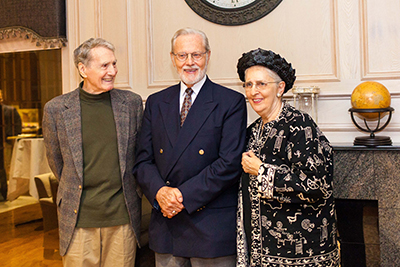
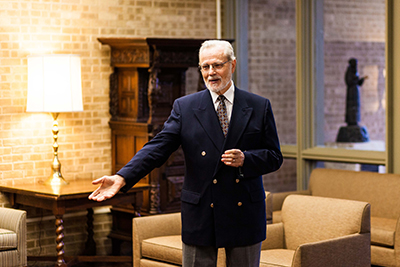
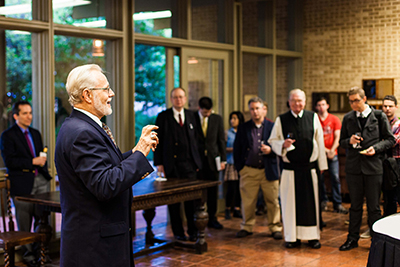
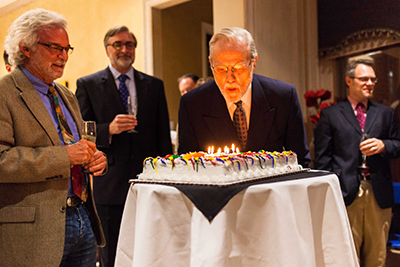
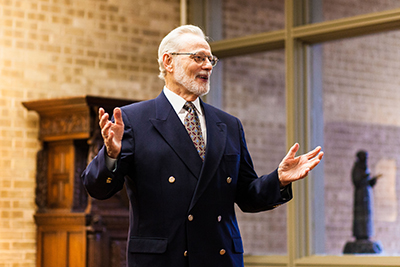
By Mary-Catherine Scarlett, BA ’21
At the University of Dallas, few aspects of the experience compare to the extraordinary, dedicated professors who grace the campus. From their eager — and often clever — integration of Core topics into seemingly unrelated subjects, the educators at UD are respected and revered by their students and colleagues alike. Of this remarkable group of people, one teacher’s legacy stands out as especially lasting and impressive.
A prolific writer, beloved teacher and world-renowned philosopher, Distinguished Professor Emeritus of Philosophy Robert E. Wood — called “Bob” by his colleagues — has gifted the university not only with over 40 years of teaching, but also with an endowed scholarship in his name and a contribution from his personal library.
The Robert E. Wood Institute of Philosophic Studies Scholarship benefits married philosophy students in the Braniff Graduate School of Liberal Arts Institute of Philosophical Studies by providing student stipends over and beyond tuition. The Institute of Philosophic Studies (IPS) is UD’s doctorate of liberal arts program, granting degrees in philosophy, politics and literature.
The reasons for this designation by Wood are many, but one certainly stands out among the rest. Despite his long career as a professor, adviser and philosopher, Wood did not always have plans to spend his days teaching; he attended Divine Word Seminary from 1948 to 1955. Professor of Philosophy Dennis Sepper, Ph.D., a longtime colleague of Wood, mentioned that Wood’s discernment of the priesthood meant “that he had a bit later start than was commonplace in graduate school.” Sepper explained that he thinks Wood “had a special sympathy for such students.”
Professor of Philosophy Chad Engelland, Ph.D., another colleague of Wood’s, noted that Wood “saw clearly that behind the generous spirit in the classroom are the many generous benefactors who make the classroom experience possible.” Because, as Engelland noted, “grad students just about anywhere are a poor lot, and married grad students are poorer still,” Engelland believes Wood intended to provide a means to ease the burden of married people working on their doctorates, especially considering many of them would be starting families. Wood married his grade school sweetheart in 1959, and has five children, 14 grandchildren and 14 great-grandchildren.
His creation of the scholarship was no doubt influenced by his own experience of being a nontraditional graduate student at Marquette University in the 1960s, as well as his sympathy for married graduate students at UD. Joshua Parens, Ph.D., dean of the Braniff Graduate School of Liberal Arts and director of the IPS, described Wood’s connection specifically to UD’s doctoral students.
“Dr. Wood had a very small house on two landscaped acres,” Parens said, “that he would rent out to students. And he ended up renting it out year after year to married students. And I think through doing that, he came to see what a special challenge it is to be working on a Ph.D. while being married — and the special financial challenges.”
Wood’s passion for teaching extended beyond the classroom; he was consistently the most requested professor for doctoral advising. “He had a reputation as being a very good director, a careful reader, who would be very helpful to students in developing their theses in their general direction and in their specifics,” Sepper said.
According to Engelland, Wood was a popular adviser “because he kept close to the questions that get people interested in philosophy in the first place, questions of meaning and purpose, questions concerning what it is that moves the human heart, questions about the all or whole.”
Although his area of expertise was in Hegelian thought, requests for Wood’s presence on doctoral committees came from students interested in every branch of philosophy. Parens attributed his openness to sitting on committees to his interest in “reconciling every part of the tradition.” Parens elaborated: “He had that very synoptic and synthetic approach to teaching, which I think was especially appealing to some Ph.D. students.”
Among students and faculty alike, Wood was an admired and respected professor. In 1996, he was named King Fellow, an honor awarded by fellow faculty to a deserving professor who has taught at UD for over eight years.
What made Wood’s classroom so magnetic? According to Engelland, the answer lies in Wood’s dynamic depth of thought. Being a student of Wood “was disorienting and transformative: Arcane concepts would suddenly spring to life and the world would thereafter appear more intensely intelligible,” Engelland said.
Wood ran the gamut of administrative positions: chairman of philosophy, chairman of the Faculty Senate, director of the M.A. in Humanities, director of the IPS doctoral programs, and graduate dean as well as acting and interim provost. He was elected to preside over the annual convention of the American Catholic Philosophical Association and for 20 years he served as editor of the American Catholic Philosophical Quarterly (ACPQ) and designed a new cover in a Mondrianesque style.
He changed the name of the journal from the New Scholasticism to the ACPQ and dedicated every third issue to a given thinker, alternating between moderns and pre-moderns. Editors were instructed to solicit primarily positive expositions before critique in order to transform the journal from one focused on the scholastics to one that embraces what John Paul II called “the precious insights of Modernity.”
In his role as provost, Wood had a plaque made for his desk that read, “I’d rather be teaching,” but his talents extend well beyond the classroom. In fact, Wood has written 90 articles and more than a dozen books. He translated two from German and with the aid of a French professor, one from the French. He edited one book, and co-edited a series and festschrift in honor of his teacher. Even now, Wood has three books currently in the process of publication.
Wood has chosen to share not only his own work with the UD Philosophy Department, but also the work of hundreds of others. “Roughly 2,300 books were generously donated by Dr. Wood to the University of Dallas,” Tyrel Garrett, a graduate assistant in the IPS, said. “Of these, the majority are works of philosophy, but his donation does include a number of classical works, and commentaries on these works, along with several works on theology … many of these works even include Dr. Wood's own notes and markings as a further guide.”
Although the sheer volume and variety of books is impressive in itself, this library will also serve as a valuable resource due to its rarity. “Dr. Wood's donation will provide students with a few rarer resources as it includes a number of out-of-print books, along with few other works that are difficult and expensive to obtain,” said Garrett.
Wood’s extraordinary skill in the classroom and influential writings contributed to his receipt of the Aquinas Medal in 2018. This honor, awarded by the American Catholic Philosophical Association (ACPA), goes to a person who is an “outstanding teacher” and has “contributed significantly to the development of philosophy in the Catholic tradition,” according to the ACPA website. Past recipients of that award include Karol Wojtyla, Joseph Pieper, Mortimer Adler and Alasdair MacIntyre.
According to Wood’s son, his father’s academic prowess extended to art and aesthetics — he wrote several books on those subjects. Like a true renaissance man, Wood created many sculptures of his own, some of them made on campus in the Art Village. One of Wood’s sculptures was a four-foot Trinitarian earth cross, now residing at the aforementioned rental house in South Irving.
Robert Wood’s legacy and influence could not be confined to the auspices of the University of Dallas. Rather, it spread throughout the Cathlic academic sphere and reached the far corners of the world. His colleagues all recall Wood’s warm and welcoming demeanor and genuine care for the well-being of his colleagues and students. Although he retired in 2020, Wood’s generosity to students through his endowment and donation of books has immortalized a legacy already deeply forged. Not only the memory of Wood, but also his goodwill, will live on at UD in perpetuum.